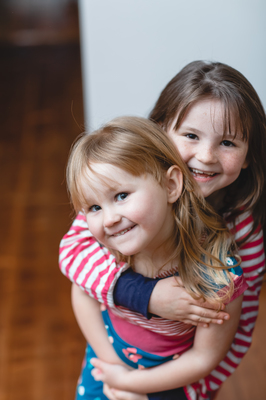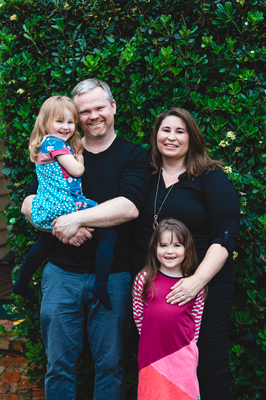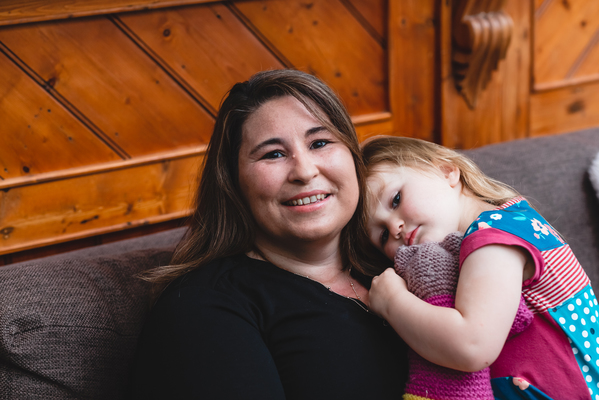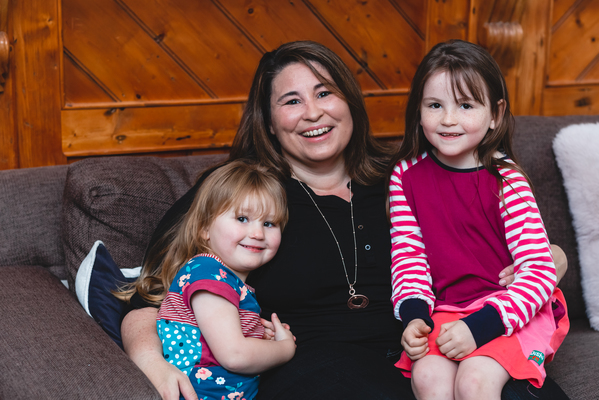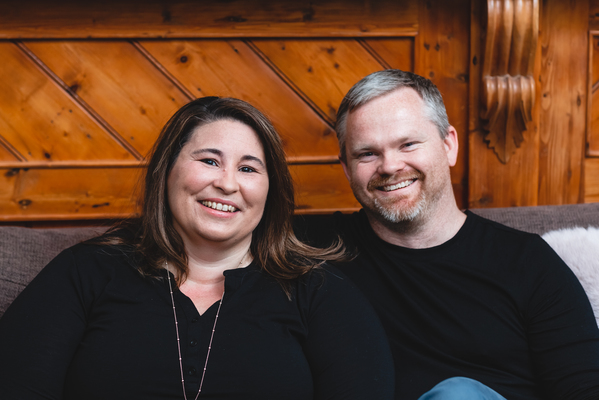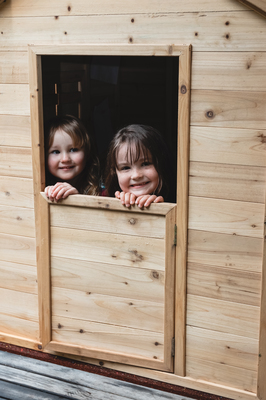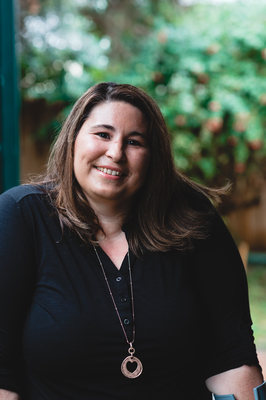By Angie Hilton
It’s a good thing we don’t have a crystal ball. Mother of two Melissa Lovell could have never predicted what would happen to her on the fourth of December, 2018.
In the prime of her life, with two masters degrees in education and criminology, two children and a loving husband, Melissa Lovell’s life changed forever when a crazed driver hit her at high speed, just 500 metres from her home in Geelong West.
I recently heard Melissa Lovell, 41, speak in front of 500 people at the Bloom Conference and I was blown away by her positive mindset whilst still being in the thick of recovery both physically and mentally. She had just progressed out of a wheelchair on to crutches after nearly a year of rehab.
Would I be right in saying it feels like your life has a ‘before’ and ‘after’. Can you paint a picture of what life was like before the accident?
Melissa Lovell: Before the accident Gareth was working full time and studying part-time. I was working three days per week in demanding but fulfilling role that I loved. I was also volunteering on the board of a local drug and alcohol facility. We were involved with a couple of other community organisations, including our daughter’s school and local church. We spent weekends off on adventures and/or with family/friends. Our kids were six and two and a half. Life had reached a sweet spot where we had completed our family and were in the groove of living busy but wonderful lives. Things weren’t perfect but they were pretty great.
Tell me about the day that changed your life?
Melissa Lovell: On Tuesday 4 December 2018 the day started like many others. Gareth had just returned home from working a 12 hour night shift. I readied the girls and myself for a busy day ahead. Emme was off to school and Harriet was spending the day with her nan. I waved them goodbye and drove out my driveway to head to work. Within a short distance I had a flash in front of my windscreen – I saw a car on my side of the road and realised it was about to hit me head on. I could see it was coming incredibly fast. I later learned the driver was travelling at 130kms/hr in a 40km/hr zone – 90 kms/hr above the speed limit.
The impact pushed every ounce of air out of my lungs. As I tried to draw breath I could feel glass in my mouth and airbag dust on my tongue. I gasped. I tried to move but realised I wasn’t able to. I was trapped.
People came rushing over to me and telling me I was going to be okay. I could see them on their phones but couldn’t register their words. I assumed by their worried looks they were calling for help. My husband arrived about 60 seconds after the impact. He imagined I’d be trying to help out at whatever scene had caused the loud bang he heard. He couldn’t believe the actual situation until he was alongside me in the car.
I was very badly injured. In fact, my life was hanging in the balance. My pelvis was very badly crushed, my ankle suffered major fractures, my leg was broken, my spine was broken in 4 places, I had 4 broken ribs, my sacrum was broken, my wrist was broken, I was bleeding internally in addition to many deep cuts and other abrasions. I was trapped in the car for almost an hour. The jaws of life freed me up to be removed on a spinal board and rushed to hospital.
Though conscious most of the time, I struggle to remember exactly how the next few hours unfolded. I ended up in ICU at Royal Melbourne Hospital and then had eight and a half hours of surgery the next day. I have metal rods holding my pelvis together and 4 more in my ankle. I spent a week in Melbourne and then was transferred to Epworth Geelong for my rehabilitation. I spent more than four months on the ward, including Christmas, New Years, my husband’s birthday along with other family celebrations.
That is all too much to comprehend. What does recovery look like from such major injuries?
Melissa Lovell: I continue to attend a range of rehab appointments most days of the week. I still have three large breaks in my pelvis and my ankle is still not too keen about being walked on. I was not permitted to walk on it properly for almost six months so it’s going to take time. I am still learning how to walk again. I am on forearm crutches most of the time but in a wheelchair for longer trips. I walk with quite a limp so I’m working hard on reducing that. I’ve also been hit with a dose of PTSD.
For a while I was only sleeping two or three hours per night and the days were not easy. I was triggered by the sound of sirens, car tyres, screeching, or passing the scene of the accident, which I have to do daily.
I imagine there’s a lot of surrendering to the situation and allowing yourself to be supported in every way. Did everyone around you come to your aid?
Melissa Lovell: The support my family and I have received has been phenomenal and life changing. Our extended family was there helping almost every day I was in hospital and continue to be on call as needed. Our friends wrapped around us with love and meals and play dates and hospital visits. Both my employer and my husband’s have done all they can to ensure that we were focused on family and recovery, which helped immensely. Our school and church communities have also provided incredible support to us all. We’ve even had neighbours offer simple things like to walk our dog for us.
How do children so young deal with seeing their mum like this?
Melissa Lovell: Our kids have been incredibly resilient. They visited me every second day in hospital and built up a relationship with the nurses on the ward. They quickly learnt where the icy poles were kept! They help me out a lot around the house. Any time I drop a crutch I hear little feet come running to pick it up for me. They’ve shown tremendous strength and empathy.
But, they’ve definitely felt the impact too. To have Mum taken away for such a long time without any warning or preparation was hard on them to say the least. Having me away for such a long time also added strain. Since returning home it’s not unusual for me to end up with a little person snuggled up in bed with me. They happily slept in their own beds prior to the accident so this is new.
I have to admit that I am comforted just as much as they are by the night time snuggles. They also like to know the exact details of when I’ll return from hospital visits in Melbourne. I’ve noticed their empathy really shines these days. If they see someone struggling they want to help, or they might ponder what life is like for people they see on the street with various disabilities. Overall they have done so very well and I am immensely proud of them.
You seem to have such a calm underlying strength. Was that what got you through?
Melissa Lovell: First and foremost I would say that God got me through. My life was hanging in the balance and there was nothing I could do in my own strength at that time. Once I was in hospital and stabilised I was filled with an overwhelming sense of gratitude. Initially I was simply grateful to be alive. I was then grateful that my injuries weren’t worse and more life altering. I was just so incredibly grateful that I was still here and mostly in one piece and able to eventually return to my life. I was going to get to watch my girls grow up. It struck me what a privilege that is and that it is one that many people haven’t enjoyed. Obviously I was in a lot of pain and would have preferred that the accident never happened. But, it was gratitude that overrode all other emotions.
So it sounds like faith and mindset are key ingredients?
Melissa Lovell: I feel like God gave me the strength to handle what was in front of me and continues to do so. However, I also make a very conscious decision to focus on the many wonderful and positive things in my life. I can choose to dwell on the struggle but I can’t see any advantage in doing so. When I am struggling I work hard to refocus on the good. As I mentioned before, I also focus on gratitude. There are many lives lost on our roads each year and many others with injuries worse than mine. In many ways I’m incredibly fortunate.
What happened to the man who did it?
Melissa Lovell: He was also very badly injured and spent a number of months in hospital. He is currently on bail and the criminal court process is underway.
What does the future look like for you and the family?
Melissa Lovell: The future looks bright. I may need further surgery in the new year to graft bone in my pelvis. This will mean more time in inpatient rehab. I also need to continue with outpatient rehab so that I can get back as much function as possible. My recovery will still take quite a while yet. No matter how everything unfolds with it though, I get to spend each day with those I love and I can’t think of anything better. We plan on taking camping trips, overseas adventures, gardening, playing at the park…..along with day to day living and learning and loving! Best of all we plan to be together. Soon we will celebrate 18 years of marriage and we look forward to many more to come. I look forward to returning to work at some point too. My employer has been incredible and my job is open and waiting for my return. I also look forward to fully engaging with friends and community life. I have to sit out a fair bit still but I can’t wait to be back in the thick of it.
What would you like to say to people who may be in the thick of a really dark of difficult time?
Melissa Lovell: I really believe the key is where you place your focus. The struggle doesn’t disappear and you need to continue to do all you can to manage your circumstances. But, if you focus on the positives you will endure your circumstances more successfully. Also, seek out supports and engage with them as needed. I see a range of professionals to assist in my recovery. Further, be honest with those close to you if you are struggling. There is power in honesty and transparency. Most of all though, focus on all that is good in your life.
You can find resources and support on the TAC website.


